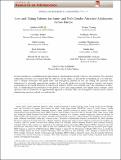Love and dating patterns for same‐ and both‐gender attracted adolescents across Europe
Abstract
Sexual orientation is a multidimensional phenomenon, which includes identity, behavior, and attraction. The attraction component, however, is less studied than the other two. In this article, we present the development of a two‐item measure to identify adolescents who prefer same‐ and both‐gender partners for love and dating. The questions were administered to nationally representative samples of 15‐year‐old adolescents in eight European countries and regions participating in the Health Behaviour in School‐aged Children (HBSC) cross‐national study. The distribution of attraction, as operationalized by preference for the gender of love and dating partners, was similar across countries. These questions offer an alternative or supplementary approach to identify same‐ and both‐gender attracted youth, without administering questions related to sexual identity.
Citation
Költő , A , Young , H , Burke , L , Moreau , N , Cosma , A , Magnusson , J , Windlin , B , Reis , M , Saewyc , E M , Godeau , E & Gabhainn , S N 2018 , ' Love and dating patterns for same‐ and both‐gender attracted adolescents across Europe ' , Journal of Research on Adolescence , vol. Early View . https://doi.org/10.1111/jora.12394
Publication
Journal of Research on Adolescence
Status
Peer reviewed
ISSN
1050-8392Type
Journal article
Description
This research was supported by the following agencies and bodies: HBSC Belgium (FWB) is funded by the Wallonia-Brussels Federation (FWB), the Office of Birth and Childhood (ONE), the Walloon Region and the Brussels-Capital Region. HBSC Bulgaria is funded by UNICEF-Bulgaria. HBSC England is funded by the Department of Health. HBSC France is funded by Santé Publique France and OFDT (French Monitoring Centre for Drug Use and Addiction). HBSC Hungary is funded by ELTE Eötvös Loránd University, Faculty of Education and Psychology. HBSC Iceland is funded by grants from the Icelandic Directorate of Health, KEA and the University of Akureyri. HBSC FYR Macedonia is funded by the United Nations Population Fund/United Nations Development Programme.Collections
Items in the St Andrews Research Repository are protected by copyright, with all rights reserved, unless otherwise indicated.

